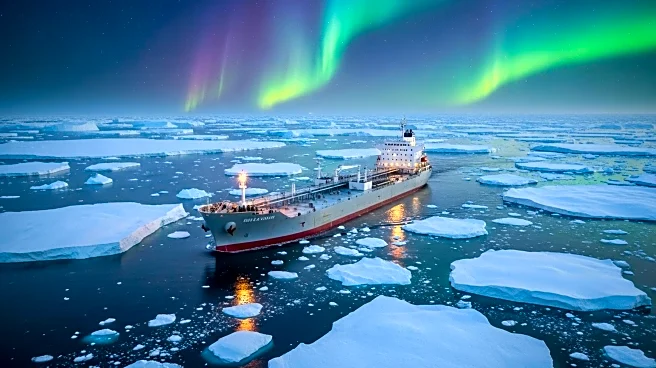What's Happening?
Russia is set to deliver oil to Brunei through the Northern Sea Route (NSR) for the first time this September, marking a significant expansion of its export reach via the strategic Arctic passage. This development follows Brunei's importation of $15.6 million worth of Russian oil in 2023, including its first Urals cargo to the Pulau Muara Besar refinery operated by Hengyi Industries. The NSR, which is navigable during summer and autumn, offers a shorter and less costly alternative to the Suez Canal, cutting shipping time by up to 10 days. Russia has been actively promoting this route to partners such as India and the U.S., although shipments have primarily been limited to China due to its proximity to Russia's Far East. Despite high costs and the need for approval from nuclear agency Rosatom, Russia plans to boost NSR shipments this year, with around 4 million barrels currently en route to China.
Why It's Important?
The expansion of Russian oil exports via the NSR is significant for several reasons. It highlights Russia's strategic use of Arctic routes to circumvent traditional shipping lanes, potentially reducing costs and delivery times for Asian markets. This move could alter global oil trade dynamics, especially as Western sanctions push Russia to seek new buyers. For Brunei, the importation of Russian oil represents a diversification of energy sources, which could impact regional energy markets and pricing. Additionally, the NSR's increased utilization underscores the growing importance of Arctic shipping routes in global trade, raising environmental and geopolitical considerations.
What's Next?
As Russia continues to promote the NSR, other countries may explore similar Arctic routes for trade, potentially increasing traffic and necessitating further infrastructure development. The strategic use of the NSR could prompt geopolitical discussions regarding Arctic sovereignty and environmental protection. Stakeholders, including environmental groups and Arctic nations, may react to increased shipping activity, advocating for sustainable practices and regulations. Furthermore, Brunei's continued importation of Russian oil could influence its energy policy and relations with other oil-exporting nations.
Beyond the Headlines
The use of the NSR for oil exports raises ethical and environmental concerns, particularly regarding the impact of increased shipping on Arctic ecosystems. The reliance on nuclear agency Rosatom for route approval and icebreaker assistance highlights the intersection of energy policy and nuclear oversight. Long-term, the NSR's development could shift global trade patterns, emphasizing the need for international cooperation on Arctic governance and climate change mitigation.











